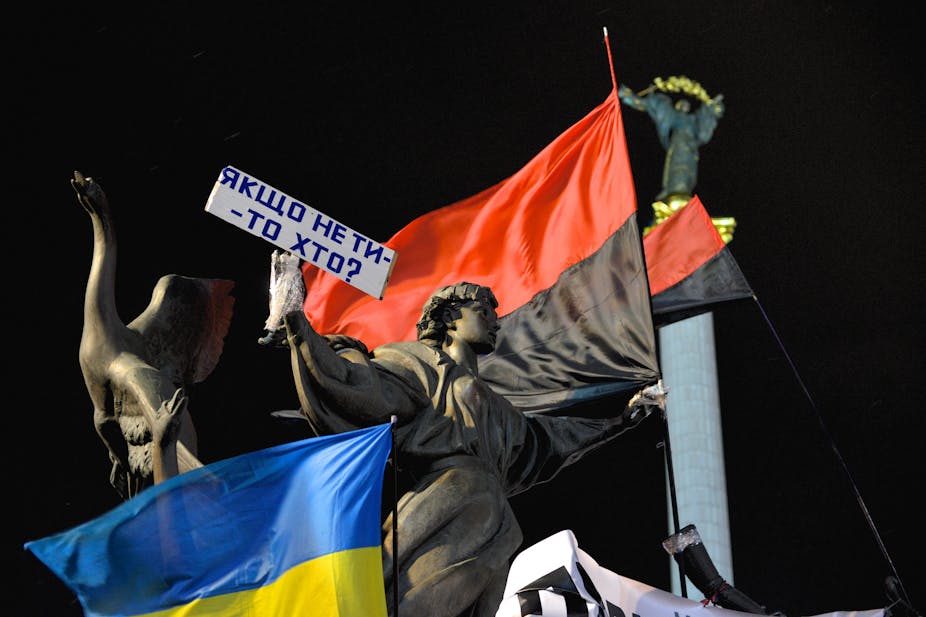Mass protests in Ukraine have come one week shy of the 22nd anniversary of the USSR being signed into obsolescence.
Ukrainians are protesting against a decision made by their government that will make a nonsense of December 8 1991, to say nothing of the Orange Revolution of November-December 2004. Both these events were supposed to usher Ukraine further into the new Europe envisaged and so hopefully described by the historic Conference for Security and Cooperation in Europe in Rome in 1993.
Then, the talk was of the indivisibility of security across Europe. How states and peoples are made secure, of course, is much debated but in the CSCE and Ukrainian vision, security would come with respect for human rights and democratic choice.
That may seem like a dream for those opposing president Viktor Yanukovych’s decision to shun deepening integration with the European Union in favour of strengthening ties with Russia. Simply put, protesters do not believe this decision reflected the people’s preferences.
We should not forget, of course, that Yanukovych was a central figure in the fraudulent elections of 2004, he was then-President Leonid Kuchma’s choice for Prime Minister, against the far more European-leaning Viktor Yuschenko. The Orange Revolution was fought in 2004 in protest at what was regarded as his political appointment rather than election, and his pro-Russian attitude, which would see them taken back to a closer relationship with Russia and away from the possibility of a deeper relationship with western Europe, through eventual membership of the EU. So there is more than a hint of déjà vu in the protests in Ukraine today.

Ukraine’s choice
That Yanukovych was frustrated with the terms of the EU’s Association Agreement is well known. Particularly galling for him was the insistence that he release his one-time rival, Yulia Tymoshenko, from prison in order to receive medical treatment in Germany. Tymoshenko is widely believed to have been imprisoned for political reasons. She, after all, was one of the leaders of the Orange Revolution. Her imprisonment became a sticking point in EU-Ukrainian negotiations, seen by the EU as a symbol of a poor human rights record in Ukraine under Yanukovych’s leadership and by Yanukovych himself as a threat to his authority.

But deeper political reasons underpin Yanukovych’s rejection of the EU and reflect the divided nature of Ukraine. Half the country is western-leaning and Catholic with stronger historical ties to parts of Europe, particularly Poland. The other half is Orthodox, with a long historical association with Russia. Russia continues to be a key player and has provided Ukraine with an alternative vision to that provided by the EU, one of membership of the Eurasian Economic Community. It is not speculation to say that Russia has put enormous pressure on Ukraine not to try to join the EU. Despite its recent claims to be a soft power actor, Russia has played hardball with Ukraine, warning that it had to make a choice between Russia and the EU and that choosing the latter would see the former adopt protectionist measures against Ukraine.
Energy is also a major factor in Ukrainian calculations. Developments since Yanukovych’s rejection of the EU suggest Russia bought that rejection with the promise of lower gas prices. In a powerful piece for Russian newspaper Kommersant, Sergei Naryshkin, Chairman of the Russian State Duma, spoke of the EU promising Ukraine only a decade of suffering, difficult times, loss of local industry and mass unemployment.
But given the not so-illustrious state of the Russian economy and previous years in which Ukraine has effectively been held to ransom by Russia over energy, it is of little surprise that so many Ukrainians would not be happy at the prospect of this level of dependence on Russia.

One beacon of light for those who continue to believe in the European integration project is that the EU, despite its ongoing financial crisis, evidently remains relevant for others.
Images of Ukrainians on the street are images in favour of the new Europe promised two decades ago. The EU has certainly put conditions upon Ukraine in relation to the Association Agreement. But there is a difference between conditions that relate to choice, especially in relation to the protection of human rights; and conditions which relate to threat, especially in relation to something as fundamental to the wellbeing of a people as energy provision.
Why are the people of Ukraine protesting? Because they see themselves as faced with a stark choice between the promise of the new democratic Europe or a return to the old authoritarian one.

